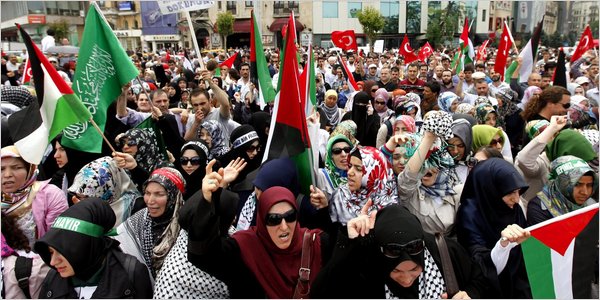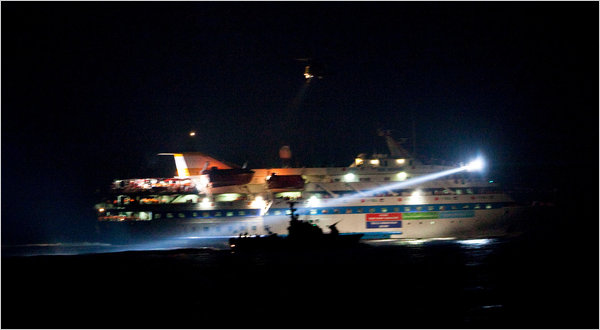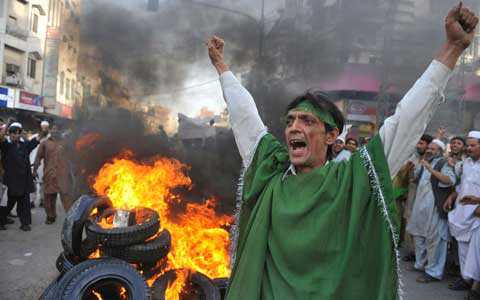
Hundreds of protesters gathered in Istanbul on Monday to condemn Israel’s naval raid. The operation was bound to deepen Israel’s isolation around the world.
By HELENE COOPER and ETHAN BRONNER
Published: May 31, 2010
WASHINGTON — Israel’s deadly commando raid on Monday on a flotilla trying to break a blockade of Gaza complicated President Obama’s efforts to move ahead on Middle East peace negotiations and introduced a new strain into an already tense relationship between the United States and Israel.
Related
-
Deadly Israeli Raid Draws Condemnation (June 1, 2010)
-
Raid Jeopardizes Turkey Relations (June 1, 2010)
-
Security Council Debates Criticism of Israeli Raid (June 1, 2010)
Prime Minister Benjamin Netanyahu of Israel canceled plans to come to Washington on Tuesday to meet with Mr. Obama. The two men spoke by phone within hours of the raid, and the White House later released an account of the conversation, saying Mr. Obama had expressed “deep regret” at the loss of life and recognized “the importance of learning all the facts and circumstances” as soon as possible.
While the administration’s public response was restrained, American officials expressed dismay in private over not only the flotilla raid, with its attendant deepening of Israel’s isolation around the world, but also over the timing of the crisis, which comes just as long-delayed American-mediated indirect talks between Israelis and Palestinians were getting under way.
Some foreign policy experts said the episode highlighted the difficulty of trying to negotiate peace with the Palestinian Authority without taking into account an element often relegated to the background: how to deal with Hamas-ruled Gaza. Hamas, the Islamist organization that refuses to recognize Israel’s existence, operates independently of the Palestinian Authority and has rejected any peace talks. Gaza has repeatedly complicated Israeli-Palestinian peace negotiations.
“This regrettable incident underscores that the international blockade of Gaza is not sustainable,” Martin S. Indyk, the former United States ambassador to Israel, said Monday. “It helps to stop Hamas attacks on Israelis, but seriously damages Israel’s international reputation. Our responsibility to Israel is to help them find a way out of this situation.”
The Obama administration officially supports the Gaza blockade, as the Bush administration did before it. But Mr. Obama, some aides say, has expressed strong frustration privately with the humanitarian situation in Gaza.
At a time when the United States is increasingly linking its own national security interests in the region to the inability of Israelis and Palestinians to make peace, heightened tensions over Monday’s killings could deepen the divide between the Israeli government and the Obama administration just as Mr. Obama and Mr. Netanyahu were trying to overcome recent differences.
“We’re not sure yet where things go from here,” one administration official said, speaking on the condition of anonymity because of the diplomatic delicacy of the issue. The White House statement said that Mr. Obama “understood the prime minister’s decision to return immediately to Israel to deal with today’s events” and that they would reschedule their meeting “at the first opportunity.”
No matter what happens, foreign policy experts who advise the administration agreed that if Mr. Obama wanted to move ahead with the peace talks, preceded by the so-called proximity or indirect talks, the flotilla raid demonstrated that he may have to tackle the thornier issue of the Gaza blockade, which has largely been in effect since the takeover of Gaza by Hamas in 2007.
Since then, Israel, the United States and Europe have plowed ahead with a strategy of dealing with the Palestinian Authority, which has control over the West Bank, while largely ignoring Gaza, home to some 1.5 million Palestinians.
Gaza was left with a deteriorating crisis as Hamas refused to yield to Western demands that it renounce violence and recognize Israel.
“You can talk all you want about proximity talks, expend as much energy as Obama has, but if you ignore the huge thorn of Gaza, it will come back to bite you,” said Robert Malley, program director for the Middle East and North Africa with the International Crisis Group.
For the Obama administration, the first order of business may be figuring out a way to hammer out a cease-fire agreement between Israel and Hamas that will end the blockade of Gaza. Several attempts in the past two years to reach such an agreement have come close, but ultimately failed, the last time when the two sides were unable to reach a consensus on the release of an Israeli soldier captured by Hamas, Gilad Shalit.
Mr. Indyk, the director of foreign policy at the Brookings Institution, says that after things cool down, the administration needs to work on a package deal in which Hamas commits to preventing attacks from, and all smuggling into, Gaza. In return, Israel would drop the blockade and allow trade in and out. “That deal would have to include a prisoner swap in which Gilad Shalit is finally freed,” he said.
It was unclear whether the indirect talks between Israel and the Palestinian Authority would suffer an immediate delay. George J. Mitchell, the Obama administration envoy to the Middle East, was still planning to attend the Palestine Investment Conference in the West Bank city of Bethlehem on Wednesday and Thursday.
The indirect talks involved American negotiators shuttling between the Israelis and Palestinians, and are widely viewed as a step back from nearly two decades of direct talks.
But their structure may actually serve the purpose of keeping them going. Mr. Mitchell and his staff have been shuttling between the two sides for more than a year, meaning that the preparation for indirect talks and the talks themselves do not look different from the outside. As a result, the American brokers could continue their shuttles despite the flotilla attack.
While the blockade of Gaza has been widely criticized around the world, Israeli officials say it has imposed political pressure on Hamas. The group has stopped firing rockets at southern Israel and is fighting discontent among the people in Gaza.
This article has been revised to reflect the following correction:
Correction: May 31, 2010
An earlier version of this article misstated the stance of the European Union on the Gaza blockade.




 Photographs
Photographs 





